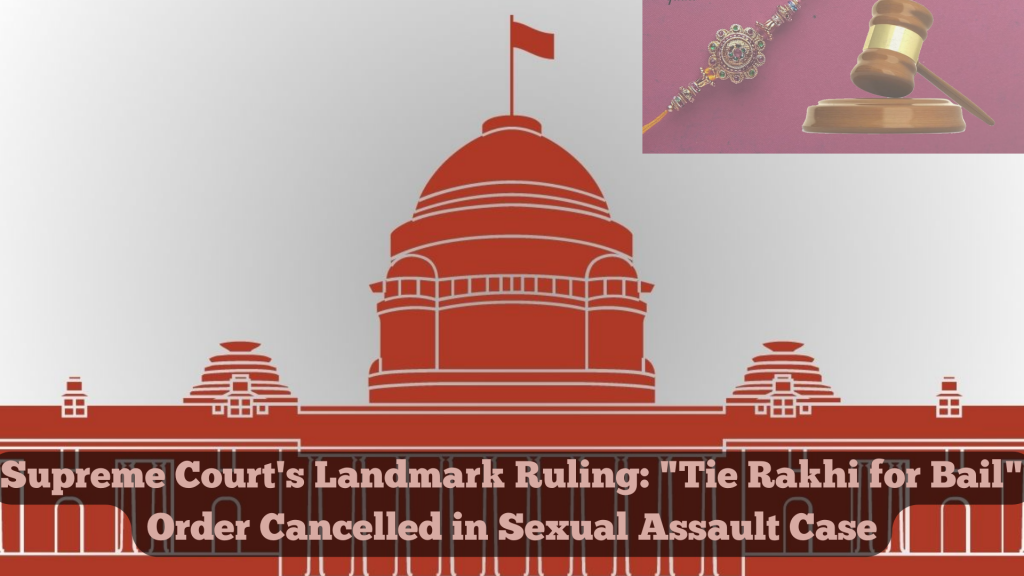
Supreme Court’s Landmark Ruling: “Tie Rakhi for Bail” Order Cancelled in Sexual Assault Case
Judgement Given On : 18/03/2021
In a landmark ruling that reaffirms the principles of justice, dignity, and gender sensitivity, the Supreme Court of India addressed the issue of bail conditions in cases of sexual assault. The case of Aparna Bhat vs. The State Of Madhya Pradesh focused on the controversial “tie rakhi for bail” order issued by the Madras High Court. This order mandated the accused to tie a rakhi to the victim, gift her 11,000 Rupees, and promise to protect her as a brother during the festival of Raksha Bandhan. Aparna Bhat, along with eight other advocates, challenged this judgment in the Supreme Court, sparking a critical examination of bail conditions in sexual assault cases. The accused in this case had allegedly sexually harassed the complainant in her own home. A charge sheet was filed following an investigation, and the accused sought pre-arrest bail under Section 438 of the Code of Criminal Procedure, 1973. Surprisingly, the High Court, while granting bail, imposed the unusual condition of tying a rakhi as part of the bail order.
Key Issues
The primary issues that came under scrutiny in this case were:
- The appropriateness of using a rakhi-tying ritual as a condition for bail in a sexual assault case.
- The impact of such conditions on the dignity and rights of the survivor.
- The broader question of judicial attitudes and language used in cases involving sexual offenses.
Key Findings and Observations
The Supreme Court’s judgment made several crucial findings and observations:
- Inappropriate Bail Conditions: The Court strongly condemned the use of rakhi-tying as a bail condition, stating that it transformed the accused into a brother through a judicial mandate. Such an action was deemed wholly unacceptable and had the effect of diluting the seriousness of the sexual harassment offense.
- Upholding Survivor’s Dignity: The Court emphasized that crimes against women, especially grave offenses like rape, were not tolerable, and offenders should be punished. The Court underlined the importance of safeguarding the dignity of survivors and ensuring that they can rely on the impartiality and neutrality of the justice system.
- Eliminating Gender Stereotypes: The judgment highlighted the need for judges to avoid using language or reasoning that diminishes the gravity of the offense or trivializes the survivor’s trauma. It called for an end to any implicit condonation of the harm caused by the accused, such as mandating mediation processes or requiring apologies.
- Gender Sensitization: Justice Ravinder Bhat stressed the importance of judges and advocates being gender sensitized to avoid reinforcing stereotypes and to ensure a fair trial for survivors.
Key Orders
The Supreme Court issued several critical directives in light of the issues and findings:
- No Contact Conditions: Bail conditions should not mandate, require, or permit contact between the accused and the victim to protect the complainant from further harassment.
- Immediate Informing of Bail: Complainants should be promptly informed that the accused has been granted bail, and a copy of the bail order must be provided within two days.
- Avoiding Stereotypes: Courts should refrain from making observations or imposing conditions that reflect patriarchal notions or engage in discussions about the complainant’s dress, behavior, or past “conduct.”
- No Compromises: Judges should not suggest or entertain any notions of compromise, mediation, or marriage between the survivor and the accused, as it is beyond their jurisdiction.
- Sensitivity: Judges should display sensitivity throughout the proceedings, ensuring the survivor is not traumatized during arguments.
- Gender Sensitization Training: The National Judicial Academy was requested to incorporate gender sensitization training, addressing stereotypes and unconscious biases, as part of the education and training of judges.
Conclusion
The Supreme Court’s ruling in the Aparna Bhat case marks a significant step forward in promoting gender sensitivity, justice, and the rights of survivors of sexual assault. It firmly rejects the use of trivializing bail conditions and emphasizes the need for a fair, impartial, and dignified process for survivors. The judgment serves as a crucial reminder that the judiciary plays a pivotal role in upholding the principles of justice and ensuring that the rights and dignity of survivors are safeguarded at all times.
